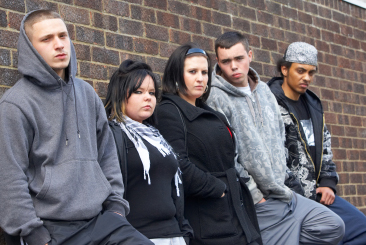|
|
| The Appeal of Gangs |
| By James Alan Fox, Lipman Family Professor of Criminology, Law and Public Policy, Northeastern University |
| Published: 07/05/2010 |
 Whatever the signs that youngsters have become gang wannabes or initiates, it hardly takes a rocket scientist--or a research criminologist--to recognize that there are increasing numbers of wayward and poorly-supervised youngsters with guns in their hands and gangs in their plans. Regrettably, as the city [Boston] celebrated the successful fight against violent crime back in the 1990s, we grew complacent and let up on our efforts. The gang problem was suppressed, but didn't disappear, and rebounded once we shifted priorities elsewhere. Unless we restore the sense of urgency, some day we may look back and call these the “good old days.”
Whatever the signs that youngsters have become gang wannabes or initiates, it hardly takes a rocket scientist--or a research criminologist--to recognize that there are increasing numbers of wayward and poorly-supervised youngsters with guns in their hands and gangs in their plans. Regrettably, as the city [Boston] celebrated the successful fight against violent crime back in the 1990s, we grew complacent and let up on our efforts. The gang problem was suppressed, but didn't disappear, and rebounded once we shifted priorities elsewhere. Unless we restore the sense of urgency, some day we may look back and call these the “good old days.”
Even while targeting gangs for intensive enforcement, as the Boston Police are attempting to do, we need also understand their special appeal. Gangs offer youngsters many desirable advantages--status, excitement, power, praise, profit, protection, and mentoring--healthy goals fulfilled in unhealthy ways. Whatever the conditions in the job market, gangs are always recruiting. For many kids in our poorest communities, the American Dream is more a nightmare. Jobs are scarce and career advancement opportunities are for those who live in more affluent places. But when it comes to gang recruiting, academic degrees and solid references don’t matter. So long as you’re tough and loyal, you can rise right to the top. There is, unfortunately, little to counterbalance all the positives and attractions of joining a gang. Today’s youngsters who are drawn to gang membership are too young to have witnessed the gang wars of the early 1990s, when joining a gang often meant an early grave. And as far as the cops and the courts are concerned, the potential consequences of gangbanging are just too remote for someone who doesn’t have a focus on the future. Today’s rewards of status among peers and respect on the street overshadow any long-term threat of punishment, especially for someone doesn’t think about what life will be like years into the future. Decision-making is all about here and now, not there and then. Our challenge, therefore, is to identify and promote healthier means for youngsters to achieve the same need-fulfillment they derive from gang affiliation--constructive ways to feel good about themselves and their prospects for the future, while at the same time having fun. This, of course, is where programs like the Boys & Girls Clubs play a significant role, and a role that, given ongoing trends, needs to be expanded. While many Americans rail on about underage, underprepared, and undermotivated parents “who just need to do a better job of raising and supervising their children,” we must recognize that many parents, struggling to balance family responsibilities with the multiple meager-paying jobs they need just to subsist, cannot do it on their own. We must assist families, not assail them, when they become overwhelmed with the day-to-day struggles of raising children, particularly in a downturn economy. So when it comes to combatting the gang problem in the city, we need more carrot sticks: rather than choosing between the carrot and the stick, we need a balanced blend of both. Editor's note: Reprinted with permission - Author James Alan Fox is the Lipman Family Professor of Criminology, Law, and Public Policy at Northeastern University. He is the author of the Boston.com blog "Crime and Punishment". He has written 18 books, including his newest, "Violence and Security on Campus: From Preschool through College." He has published dozens of journal and magazine articles, and hundreds of freelance columns in newspapers around the country, primarily in the areas of multiple murder, youth crime, school and campus violence, workplace violence, and capital punishment. Other articles by Fox: |
MARKETPLACE search vendors | advanced search

IN CASE YOU MISSED IT
|


Comments:
No comments have been posted for this article.
Login to let us know what you think